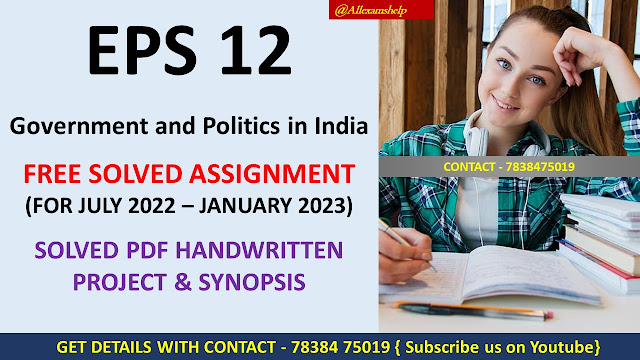Free IGNOU EPS 12 Solved Assignment 2023-24 for July 2023 and January 2024 Session, All IGNOU Assignments (Programme Wise) · Master's Degree Programmes · Bachelor's Degree Programmmes · P.G. Diplomaa Programmes · Diploma Programmes · Certificate Programmes. IGNOU Assignment 2023-24 (UPDATED) Get Here. IGNOU Assignment Status 2023-24, Marks, Grade Card, Practical Submission
E.P.S – 12
Government and Politics in India IGNOU EPS 12 Solved
Assignment 2023-24
GET PDF & Handwritten (Paid)
WhatsApp - 7838475019
NOTE: All questions are compulsory.
A) DCQ:
Answer any two of the following in about 500 words each.
Q1. Critically analyse the conflicts between Union and States
and their implications.
1.
Constitutional Framework:
Implication:
Conflicts between the union and states often revolve around the interpretation
of the constitution. These conflicts can result in legal battles, which may
lead to delays in policy implementation and create uncertainty.
2. Resource
Allocation:
Implication:
Disputes over resource allocation, such as revenue sharing and distribution of
funds, can hinder economic development in the affected states. It may lead to
unequal development and resentment among states.
3. Administrative
Authority:
Implication:
Conflicts over administrative authority can result in inefficiencies and delays
in the implementation of welfare programs, as states may resist central
government intervention or policies.
4. Fiscal
Federalism:
Implication:
Disagreements over taxation and fiscal policies can affect the fiscal health of
states and the country as a whole. Disputes may lead to revenue deficits in
states or hinder the achievement of national development goals.
5. Political
Differences:
Implication:
Political conflicts between the central government and states can undermine
cooperative federalism and hinder the smooth functioning of government
institutions. These disputes may also impact the delivery of essential services
to citizens.
6. Cultural and
Linguistic Diversity:
Implication:
India's linguistic and cultural diversity can lead to identity-based conflicts
between states and the union. This may affect social harmony and national
integration.
7. Emergency
Powers:
Implication:
Conflicts related to the declaration of national emergencies can have profound
implications for democracy and civil liberties. The misuse of emergency powers
can lead to a concentration of authority and curtailment of state autonomy.
8. Policy
Implementation:
Implication:
Disagreements over the implementation of policies can result in non-cooperation
from states, hindering the success of national programs, including those
related to healthcare, education, and infrastructure.
9. Impediment
to Economic Reforms:
Implication:
States' resistance to economic reforms and liberalization policies can stifle
economic growth and competitiveness. This may have implications for attracting
investment and generating employment.
10. Implications
for International Relations: - Conflicts between the union and states can
affect international relations, especially when states have their foreign
relations, trade, or other policies that may be at odds with the central
government's stance.
11. Implications
for Democracy: - If conflicts between the union and states result in a
breakdown of the federal system, it could weaken the democratic fabric of the
country and undermine the principles of federalism and decentralization.
12.
Implications for Public Trust: - Repeated conflicts and deadlocks can erode
public trust in government institutions. Citizens may become disillusioned with
the government's ability to address their concerns and meet their needs.
In conclusion,
conflicts between the union and states in a federal system like India's can
have far-reaching implications for governance, social harmony, economic
development, and democracy. While some level of tension between central and
state governments is inevitable in a diverse and complex nation, it is
essential for the leaders at both levels to work collaboratively, respecting
the principles of federalism and seeking constructive solutions to these
conflicts. Striking a balance between the autonomy of states and the need for a
strong central authority is crucial for the effective functioning of a federal
system.
Q2. Discuss the factors that establish constitutional supremacy
rather than parliamentary supremacy in India.
B) MCQ:
Answer any four of the following in about 250 words each.
Q3. Discuss the process of reorganisation of North-East India.
Q4. Discuss the National Emergency under Article 352 of the
Constitution of India.
Q5. Analyse the changing nature of the party system in India.
Q6. Examine the relationship between caste and land ownership in
rural India
C) SCQ:
Write a short note on any two of the following in about 50 words each.
Q7. Examine the role and utility of the Inter-State Council.
Q8. Analyse the reasons for the emergence of the Telugu Desam
Party in Andhra Pradesh.
IGNOU
EPS 12 Solved Assignment English Medium 2023-24 The Indira Gandhi National Open
University has updated the IGNOU Assignment Status
2023-24 December Session so that students can know if their submission is
completed or not. Now if you have also submitted your
Assignment/Practical/Project till 15 December 2023 then you must be worried
about the Assignment Status and Grade Card. So we decided to come
up with https://ignouadmission.samarth.edu.in/ Assignment 2023-24.
For SOLVED PDF & Handwritten
WhatsApp No :- 7838475019
